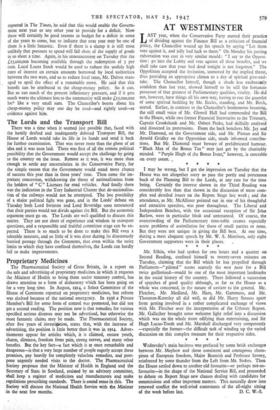AT WESTMINSTER
IAST year, when the Conservative Party started their practice 4 of dividing against the Finance Bill as a criticism of financial policy, the Chancellor wound up his speech by saying " Let than vote against it, and jolly bad luck to them." On Monday his parting exhortation was cast in very similar mould : " I say to the Opposi• tion : go into the Lobby and vote against all these benefits, and we shall take care that your bad deed tonight is not forgotten." The Oppoktion accepted the invitation, unmoved by the implied threat, thus providing an appropriate climax to a day of spirited give-and- take. The Chancellor himself, though a shade less exuberantly confident than last year, showed himself to be still the fortunate possessor of that greatest of Parliamentary qualities, vitality. He did not, however, have things all his own way, having to run the gauntlet of some spirited heckling by Mr. Eccles, standing, and Mr. Birch, seated. Earlier, in contrast to the Chancellor's bonhomous booming, the still small voice of Mr. Glenvil Hall had commended the to the House, while two former Financial Secretaries to the Treasury, Captain Crookshank and Mr. Osbert Peake, had skilfully analysed and dissected its pretensions. From the back benohers Mr. Jay and Mr. Diamond, on the Government side, and Mr. Pitman and Sir Arnold Gridley on the Opposition side, made informed contribu- tions. But Mr. Diamond must beware of prefabricated humour. " Black Max of the Bonus Tax " may just get by the charitably minded. "Purple Hugh of the Bonus Issue," however, is execrable on every count.
* * * * I may be wrong, but I got the impression on Tuesday that the House was not altogether sorry to pass the portly and portentous buck of the Planning Bill to the Lords, at any rate for the time being. Certainly the interest shown in the Third Reading was considerably less than that shown in the discussion of more com- plex and detailed issues on the Report Stage last week ; and the attendance, as Mr. McAllister pointed out in one of his thoughtful and attractive speeches, was poor throughout. The Liberal and Independent Benches, with the occasional exception of Sir John Barlow, were in particular bleak and untenanted. Of course, the overcrowding of the Parliamentary time-table creates especially acute problems of assimilation for those of small parties or none.
But they were not unique in giving the Bill best. At one time, during a most eloquent speech by Mr. W. S. Morrison, only eight Government supporters were in their places. . * * * * Mr. Silkin, who had spoken for two hours and a quarter on Second Reading, confined himself to twenty-seven minutes on Tuesday, claiming that the Bill which he has propelled through Parliament—" piloted " seems scarcely the mot juste for a Bill twice guillotined—would be one of the most important landmarks in the social history of the country. There followed a succession of speeches of good quality although, as far as the House as a whole was concerned, in the nature of caviare to the general. Mr.
Fletcher, Mr. Medland, Mr. Hare, Mr. Gammans, and Mr. Thornton-Kemsley all did well, as did Mr. Harry Strauss apart from getting involved in a rather complicated exchange of views with Mr. Fletcher over the interpretation of the Uthwatt Report.
Mr. Gallacher brought some welcome light relief into a discussion which was on the whole more edifying than entertaining, and Sir Hugh Lucas-Tooth and Mr. Marshall discharged very competently —especially the former—the difficult task of winding up the varied discussion on this complex measure for their respective sides.
* * * * Wednesday's main business was prefaced by some brisk exchanges between Mr. Mayhew and those consistent and courageous cham- pions of European freedom, Major Beamish and Professor Savory, reinforced by some thunder from the Left from Mr. Stokes. Then the House settled down to another old favourite—or perhaps not-so- favourite—in the shape of the National Service Bill, and proceeded to debate on Report Stage new clauses dealing with candidates for commissions and other important matters. This naturally drew into renewed conflict the well-tried contestants of the all-night sitting


































 Previous page
Previous page